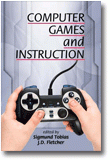
Computer Games and Instruction
Edited by:
Sigmund Tobias, State University of New York–Albany
J. D. Fletcher, Institute for Defense Analyses
Published 2011
There is intense interest in computer games. A total of 65 percent of all American households play computer games, and sales of such games increased 22.9 percent last year. The average amount of game playing time was found to be 13.2 hours per week. The popularity and market success of games is evident from both the increased earnings from games, over $7 Billion in 2005, and from the fact that over 200 academic institutions worldwide now offer game related programs of study.
In view of the intense interest in computer games educators and trainers, in business, industry, the government, and the military would like to use computer games to improve the delivery of instruction. Computer Games and Instruction is intended for these educators and trainers. It reviews the research evidence supporting use of computer games, for instruction, and also reviews the history of games in general, in education, and by the military. In addition chapters examine gender differences in game use, and the implications of games for use by lower socio-economic students, for students’ reading, and for contemporary theories of instruction. Finally, well known scholars of games will respond to the evidence reviewed.
CONTENTS
Preface. SECTION I: INTRODUCTION TO COMPUTER GAMES. Introduction, Sigmund
Tobias and J. D. Fletcher. Searching For the Fun in Learning: A Historical
Perspective on the Evolution of Educational Video Games, Alex Games and Kurt
D. Squire. Using Video Games as Educational Tools in Healthcare, Janis
A. Cannon-Bowers, Clint Bowers, and Katelyn Procci. After the
Revolution: Game-Informed Training in the U.S. Military, Ralph Ernest Chatham.
Multi-User Games and Learning: A Review of the Research, Jonathon Richter
and Daniel Livingstone. SECTION II: REVIEW OF THE LITERATURE AND REACTIONS.
Review of Research on Computer Games, Sigmund Tobias, J. D. Fletcher, David
Yun Dai, and Alexander P. Wind. Reflections on Empirical Evidence on
Games and Learning, James Paul Gee. Developing a Research Agenda for Educational
Games and Simulations, Chris Dede. Comments on Research Comparing Games
to Other Instructional Methods, Marc Prensky. SECTION III: COMPUTER
GAME ISSUES. Multimedia Learning and Games, Richard E. Mayer. Action
Game Play as a Tool to Enhance Perception, Attention and Cognition, Ashley
F. Anderson and Daphne Bavelier. Developing an Electronic Game for
Vocabulary Learning: A Case Study, Michael L. Kamil and Cheryl Taitague.
Instructional Support in Games, Henny Leemkuil and Ton de Jong.
Implications of Constructivism for the Design and Use of Serious Games, Jamie
R. Kirkley, Thomas M. Duffy, Sonny E. Kirkley, and Deborah
L. H. Kremer. Implications of Game Use for Explicit Instruction, Putai
Jin and Renae Low. Cost Analysis in Assessing Games for Learning, J.
D. Fletcher. Using Computer Games to Teach Adult Learners Problem Solving,
Joan (Yuan-Chung) Lang and Harold F. O’Neil. Gender and Gaming,
Elisabeth R. Hayes. Computer Games and Opportunity to Learn: Implications
for Teaching Students from Low Socioeconomic Backgrounds, David Yun Dai
and Alexander P. Wind. SECTION IV: EVALUATION AND SUMMING UP. Stealth
Assessment in Computer-Based Games to Support Learning, Valerie J. Shute.
Computer Games, Present and Future, Sigmund Tobias and J. D. Fletcher.
Author Identification.
REVIEWS
"Sigmund Tobias and J. D. Fletcher, in the their edited volume Computer Games and Instruction, provide a much-needed attempt to synthesize and bring coherence to existing research on serious games and suggest fruitful directions for future research. ... Although the conclusion drawn by the editors that the state of game research is 'less robust than one might wish' (p.541), the volume marks a major milestone in the serious games literature and is well worth reading." Ronald D. Owston York University in Educational Researcher
"…the book does a very effective job in convincing readers (including this reviewer) that instructional games have truly come to a point where all professionals in this field (researchers, educators, trainers, designers, developers, etc.) need to understand how to appropriately utilize these instructional tools.
In summary, the book is comprehensive, extremely well researched, and effectively written, and it will be of interest to a broad audience…the book is a reference compendium that would be a welcome addition to the bookshelves of a wide spectrum of instructional and research professionals." William D. Milheim in Educational Technology
"This is an important book that I can highly recommend for both beginning and experienced researchers in this area, and for anyone who has an interest in computer games and their current and future use to enhance the learning process." Tim S. Roberts in Teachers College Record
MORE INFORMATION
Serious Games: Developing a Research Agenda for Educational Games and Simulations
By: Chris Dede @ Harvard
-
Paperback978-1-61735-408-3
Web price: $62.04 (Reg. 72.99)
-
Hardcover978-1-61735-409-0
Web price: $89.24 (Reg. 104.99)
- eBook9781617354106

- TEC066000 - TECHNOLOGY & ENGINEERING: Research
- EDU039000 - EDUCATION: Computers & Technology
- COM032000 - COMPUTERS: Information Technology
-
 Adolescents in the Internet Age
A Team Learning and Teaching Perspective Third Edition
Adolescents in the Internet Age
A Team Learning and Teaching Perspective Third Edition
-
 Effects of Government Mandates and Policies on Public Education in Africa, the Caribbean, and the Middle East
Effects of Government Mandates and Policies on Public Education in Africa, the Caribbean, and the Middle East
-
 Innovations in Computational Intelligence, Big Data Analytics and Internet of Things
Innovations in Computational Intelligence, Big Data Analytics and Internet of Things
-
 Machine Learning, Natural Language Processing, and Psychometrics
Machine Learning, Natural Language Processing, and Psychometrics
-
 Preparing Pre-Service Teachers to Teach Computer Science
Models, Practices, and Policies
Preparing Pre-Service Teachers to Teach Computer Science
Models, Practices, and Policies
-
 Teaching and Learning Online
Science for Elementary Grade Levels
Teaching and Learning Online
Science for Elementary Grade Levels
-
 The High School Teacher Technology Guidebook
22 Questions and 313 Answers
The High School Teacher Technology Guidebook
22 Questions and 313 Answers

